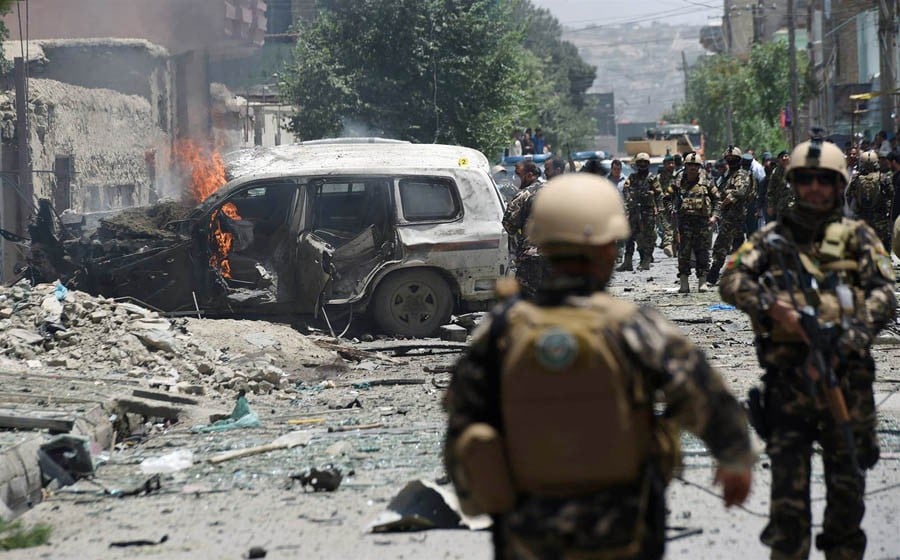
A Pashtun-dominated Islamist government and an acquiescent India are Islamabad’s two vital objectives in Afghanistan

In the wake of a string of deadly truck explosion and suicide assaults in Afghanistan in the month of Ramzan, Afghan President Ashraf Ghani, while speaking at the one-day peace conference in Kabul, said: "We cannot figure out what is it that Pakistan wants [in Afghanistan]." This article replies to Dr Ghani’s query. It contends that Pakistan envisions two vital interests in Afghanistan. These are a Pashtun-dominated Islamist government which is pro-Pakistan and anti-India and an acquiescent India, which is in no position to threaten Pakistan’s interests.
Islamabad wants a Pashtun-dominated Islamist government for a couple of reasons. Contrary to the perception, Durand Line dispute isn’t the major reason. There is no conclusive evidence to show that Pakistan has ever formally asked Afghanistan for the recognition of Durand Line. If for the sake of argument, it is assumed that Taliban rejected Pakistan’s offer to formalise Pak-Afghan border, as a few political commentators believe so, then there is no rationality behind supporting the same Taliban. In fact, the country’s official stance is that Durand Line is an international frontier, a position that it derives from being the successor of all rights and duties that accrue from British border agreements. For sure, Islamabad wants a compliant regime in Kabul that even won’t raise the issue.
The main reason Islamabad envisages an Islamist government is premised on the assumption that a religious government is averse to support secession in the name of ethnicity. Afghanistan, when ruled by monarchs, communists and nationalists, has harbored dissident Pashtun and Baloch nationalists from Pakistan. So, the argument runs, any future Baloch or Pashtun secessionist movement is doomed to failure if it does not get any support from Afghanistan. An Islamist government in Kabul led by Pashtuns is perceived to be a sure guarantee against such an eventuality. Taliban didn’t shelter any nationalist from Pakistan; nor did Durand Line issue bother them. Thus, Pakistan’s alleged support to Taliban is seemingly a well-thought-out policy than a strange coincidence.
Secondly, Pakistan conceives an impotent role for India in Afghanistan. This means India shouldn’t be in a position that might prove inimical to Islamabad’s interests. Pakistan has deepest apprehension of its eastern neighbour. Apparently, policymakers believe that East Pakistan could never have become Bangladesh had it not been for the reason of Indian intervention to disintegrate Pakistan. Similarly, if given opportunity again, India won’t shy away from repeating the history.
Post-Taliban era, Pakistan feels encircled by robust Indian presence in Afghanistan. Islamabad’s reading is that India uses Afghan soil for fomenting trouble inside Pakistan by supporting Tehreek-e-Taliban Pakistan and Baloch separatists, the latter being considered similar to Mukti Bahini, the Bengali separatists, aided and abetted by India, from erstwhile East Pakistan.
Against this backdrop, Pakistan can’t afford to remain vigilant on its two long eastern and western borders. Overstretched, the country’s army has deployed more than 100,000 troopers across Pakistan side of the Durand Line for more than a decade now. Likewise, after the ouster of Taliban in 2001, with Afghan nationalists in the seat of power and given India’s popular image in Afghanistan, it couldn’t be worse.
Pakistan’s cherished policy of ‘strategic depth’ is rendered abortive. In dire straits, Pakistan allegedly supports Taliban because the militia has remained diametrically opposed to India. Taliban provided for being the only pro-Pakistan and anti-India regime ever since the independence of Pakistan in 1947. To summarise, Pakistan’s support to Taliban is aimed to kill two birds with one stone: Taliban are anti-nationalists and anti-India.
Reading between the lines, Pakistan’s interests in Afghanistan can be simplified to an essential difference between objectives and means to realise them. An Islamist government is the means to realising the goals of a neutralised India and a complacent Kabul that harbours neither dissident nationalist leaders from Pakistan nor make irredentist claims across Pakistan side of the Durand Line. How Kabul readjusts its priorities is a critical test of the Afghan diplomacy.
For Afghans, conceding to Pakistani interests may appear an affront to their sovereign status. In a world dictated by power politics, respect for sovereignty is a myth. Russia considers 15 former soviet republics from Baltic States to Central Asian Republics to Caucasus as its "soft underbelly". Russia’s five-day war with Georgia in 2008, its annexation of Crimea in March 2014 and Moscow’s covert war in eastern Ukraine are glaring examples of Russia’s revisionistic designs. Like the Monroe Doctrine of 1823, which warned European Powers that Latin America fell under Washington’s exclusive sphere of influence, Islamabad’s policy towards Kabul is poised to impress upon Delhi that Kabul is Islamabad’s sphere of undisputed influence wherein India must not do anything hostile to Pakistan’s interests.
In the international arena, where there is no sovereign body above states, ‘sovereign equality’ is a mere illusion! For the weaker party in a conflict, the threat of Athenian aggression to Melians in 416 B.C is instructive. "[What is] right is only in question between equals in power", the Athenian envoy jibed at his Melian interlocutors. The Athenian offer to Melians was to surrender to what the stronger wanted or be crushed! "While the stronger do what they can and the weak suffer what they must," the envoy concluded with sheer effrontery.
Post 9/11, coercing Pakistan into cooperating with the US, Richard Armitage, assistant secretary of state to Bush, echoed the Athenian emissary. "Be prepared to be bombed. Be prepared to go back to the stone age," Armitage threatened Pakistan’s intelligence director as revealed so by General Pervaiz Musharraf back in 2006.
Of course, power changes hands. "Our present situation is neither natural nor inevitable," Noah Harari tells us in his insightful book, A brief history of mankind. Until the weaker rival becomes the stronger, it has to conform to what power dictates. This is the cardinal rule of politics in the anarchical world!